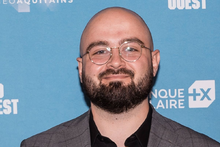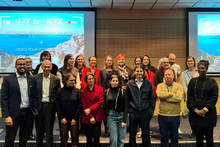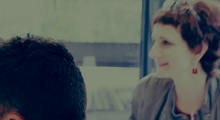2024 is all about you: your successes, your...

Meeting with Côme, a KEDGE Alumnus living in Singapore
For the final leg of Kedge Asian Success's trip, Pro Act Nomad members met with Côme De La Porte in Singapore. After a university exchange in Singapore, Côme decided to come back and now works at Michelin.
Hello Côme! To start off, would you describe your educational background? What training did you have before, during, and after attending KEDGE?
After high school, I studied marketing techniques at the Institute of Technology (IUT) in Paris, and after that I did a licence in management. I then passed the entrance exam for business school for a parallel admission and entered KEDGE in a Master 1.
I was at KEDGE for three years, including my gap year. Then, since I decided that I hadn’t had enough of studying, I enrolled in the Sorbonne for another Master’s - Development and Humanitarian Action. It’s not related to business, but it was an area that I really liked, and I had already planned to take courses related to this field even before starting business school, but when you enter a business school it’s not generally the type of course that they suggest to you first and foremost.
So that’s my educational background. Regarding my professional experiences, I had to do an internship for my DUT, and I did that in a communications agency, which was interesting enough. I even thought about having a career in communications for a while, but I was always attracted to the non-profit sector and was always involved with various associations. What I particularly liked about that internship is that it was a communications agency that worked directly with associations to help them put together their fundraising campaigns. It was the company that made the advertisements in the subway for UNICEF, the Red Cross, etc.
1 minute / 1 kedger : Côme, alumnus living in SingaporePublished by Kedge Business School Alumni on Tuesday, 19 June 2018
Then in L3, I did an internship in accounting and management control with a small television station, which I also thought was interesting.
Then I went back to KEDGE, and after four months of classes, I went on a six-month internship with Carrefour Belgium, in sports marketing. My job consisted of marketing and promoting sponsorship of the Red Devils (the Belgian national football team). This was during the 2014 World Cup in Rio. It was great. That was an experience that I really enjoyed, so I asked myself if I wanted to continue in marketing. It turns out that I didn’t go that route and I’ve done nothing that has anything to do with marketing since my gap year.
I spent a year volunteering in Zambia, on a VSI contract (Volontariat de Solidarité Internationale/Volunteering for International Solidarity). It’s the equivalent of a VIE, but in the voluntary field. I was with a small association called FIDESCO, which took about 70 volunteers a year. I was sent to work with some Italian missionary brothers who had built an educational complex that went from preschool to a secondary technical school. Four of us were sent, three French and one American.
My role was to take care of the preschool. I was in charge without being in charge of the classes. I had a coordinator role, which consisted of organising the daily activities of the school, leading projects, organising staff and parent/teacher meetings, etc. That experience really left its mark on me, so I told myself that I wanted to go further in the non-profit sector. At that time, I asked myself, “why not?” I wanted to be able to tell myself that all the hours I was putting in would do more than just increase the bottom line by 0.5%. I told myself that the work would be for a better purpose, particularly since there is generally more of need for those with a higher education in emerging or developing countries than there is in France where, at the end of the day, dozens of people with bachelor’s and master’s degrees fight for reasonable job after two years of studies. I thought that there was a need for qualified people in this sector. 10 or 15 years ago, the non-profit sector was more amateur than it is now because development and humanitarian careers are being professionalised.
After my gap year spent volunteering, I did another six months at KEDGE, then went to Singapore Management University (SMU) in Singapore for a university exchange. Incidentally, I was able to take a development course during the exchange called “Development, Under Development, and Poverty”, which was a subject I really enjoyed and is what clinched my interest in that subject. Afterwards, I told myself that I’d look into it further, and so that’s why I did the master’s at the Sorbonne.
Then I enrolled at the Sorbonne and had six months of super interesting courses on the cooperation between France and other countries, bilateral or multilateral cooperation, development economy, migration, health, climate, etc. And after six months of this internship, incorporated this training. And as it happens, I decided to keep working in business while staying connected to the non-profit sector at the same time. I did an audit of the non-profit sector with Deloitte, and over a 6-month period we conducted 3- to 4-day audits with clients who were associations and foundations, such as Doctors of the World, the Red Cross, Les Restos du Coeur, etc. I also audited the Michelin Foundation, which probably played a role in my being employed with them.
So consequently, these last few years I’ve always tried to be at the frontier between the business world and the non-profit sector.

Would you tell us about your decision to move to Singapore?
First of all, I’m sure you remember that I had done a six-month exchange in Singapore, so it wasn’t a completely foreign country to me. That’s was why I didn’t have the specific concerns which you can have when you’re offered a job in a country that you don’t know at all, and which you’ve barely even heard of. So when someone offered a position in Singapore, I said ok. To be honest, I wasn’t particularly looking in Singapore. I was looking more in Thailand, but admittedly I had broadened my search to Southeast Asia in general. I did not see myself likely to go to Korea, Japan, or China. So, the more relevant question would be to ask me why I chose an international move more so than why I chose to go to Singapore in particular.
Even though I certainly would like to return to France at some point, I absolutely want to spend the early part of my career working internationally because you learn so many things. So, I wasn’t motivated to move here for financial reasons, but it was rather because of the ability to be in contact with other cultures. To broaden my way of thinking. I believe that the fewer things you have in common with people, the further apart the cultures are, the more interesting it is to converse because you learn an enormous amount, but you also feel that you are giving something to the other person as well. That said, I felt this cultural gap in more in Zambia than in Singapore, which is somewhat westernized. My final reason for moving here was the realisation that, professionally, you can advance much faster and you obtain higher positions much quicker when you work abroad. I have a lot more responsibilities with Michelin in Singapore than I would have had I stayed with Deloitte in Paris.

Would you give us more detail about your current job with Michelin?
I work for Michelin, whose purchasing centre of natural rubber here in Singapore. To tell you a little bit about it, natural rubber comes from a tree called a “Hevea”, or rubber tree. It is a native of Brazil and used to not exist in Asia. The particularity of this tree is that when you cut it, natural rubber comes out. I bleeds a sticky white liquid that is harvested in buckets, dried, then delivered to factories to be washed and transformed into pellets. It’s in this form that the rubber is sent to the factories that make tyres. Tyres contain between 15-60% natural rubber on average, depending upon whether they are for motorbikes, cars, lorries, construction equipment, etc.
Even though the rubber tree is a native species of Brazil, it was attacked by parasites about 50 years ago, so it’s not possible to have industrial plantations today in Brazil. Now rubber trees are only found in forests, growing amongst other trees, because if the rubber trees touch each other, the parasite can grow and kill them. So back then, someone clever planted it in Southeast Asia because its climate is similar to that of Brazil’s. Today, 90% of the world’s rubber production comes from Asia. Needless to say, tyre manufacturers such as Michelin are based in Asia, and more specifically in Singapore because it has the second largest Asian port after Shanghai. So that means that rubber is produced throughout Asia (Thailand, Indonesia, Malaysia, etc.), then it’s sent to Singapore. From there, it’s distributed throughout the world.
Michelin’s purchasing centre is here in Singapore, which has a somewhat unusual name : “SMPT; la Société des Matières Premières Tropicales” (tropical raw materials company). I work for SMPT, which sources rubber and sends it world-wide. It handles quality, logistics, finance, accounting, and CSR – corporate social responsibility. I work in this last department, CSR.
In fact, tell us about Michelin’s CSR approach.
Michelin has been a true pioneer in terms of corporate responsibility, even before the term began being used. Michelin was formed in the 19th century, but by the end of 1950 the group had created Michelin nursery schools and other things. In this case it was for the welfare of the company more than for the environment. But you must know that CSR covers not only the environment, but also the wellbeing of employees, and the respect of people and humanity in general. So Michelin started working on CSR internally by improving the wellbeing of its employees, then after afterwards began addressing the CSR policies in external companies. It particularly does a lot in road security, mainly in the Southeast Asia region, holding road safety sessions in children’s homes, in schools, or offering by offering training in road safety.
Going back to my job, it covers social responsibility in the natural rubber sector. Michelin has developed a smartphone app designed to evaluate the supply chain via a questionnaire in order to identify the social and environmental risks associated with the production of natural rubber. Why? Because the natural rubber supply chain is a mess. I mean, there are tens of thousands of small producers, whereas in other markets there would be industrial plantations. 85% of the natural rubber produced comes from plantations of less than 3 hectares (7.5 acres). In other words, from mini-plantations. So there are thousands of small producers behind every factory that makes rubber pellets. Michelin’s thought was "well, we buy rubber from these factories but we don’t know what is happening before it gets there. How do we know there is no deforestation, child labour, forced labour, etc, in the rubber that we buy?” Michelin doesn’t want to buy “dirty” rubber. If we find any bad practices, we try to take remedial action and reduce the risks associated with its harvesting.

Michelin wanted to know how it could find out what goes on in these thousands of mini-plantations. We decided to interview all stakeholders in the rubber supply chain - from the factory and down to the small farmers - via a questionnaire. Michelin has all the factories with which it works interview those who make deliveries. And those make the deliveries must interview those who are below them in the supply chain, and so on. The responses will allow us to create a map of at-risk zones related to rubber harvesting, and to sound any alarms if necessary. We are still in the process of carrying out this questionnaire. The next step will be to take any action needed to resolve any problems that are brought to light. So my role is to disseminate this questionnaire, mainly in Indonesia and Thailand, and to train the factory workers in using the app.
What differences do you see in the work culture between France and Singapore?
I don’t think that I’m in the best position to answer this question because not only is my boss French, but many of the managers working for Michelin in Singapore are also French. I have some Singaporean colleagues, but I don’t work with them much.
However, I have noticed some differences. It's very hierarchical here, which is specific to Asia in general. I’m sure all the points I’ll make must have come up often during your interviews. In Asia you need approval for everything. I also find that Singaporeans are very poor at taking initiative, and actually that’s why Michelin practically no longer employs trainee Singaporeans. It would probably be perfectly fine in a Singaporean company, but it doesn’t really work well at Michelin. One last thing, I also have the impression that you get more done here than you would France. People are less focused on their career and their work in France than they are in Singapore. In France you can have a life outside your job, here your job is your life. If someone asks you, “What do you do?”, and you say, "I am responsible for ..." you are immediately taken more seriously.
What are your ambitions for the future? Where do you see yourself in 5 years?
For me, Africa. I loved Africa. Right now I'm working in Asia and I'm very happy, but I really want to go back one day. I liked it a lot. Relationships are very different there, much more relaxed. Here relationships between colleagues are much more formal than they are in either France or Africa. At home, it’s much easier to confide in your colleagues or talk about personal matters. I'm not saying that it's not possible to do that here, but you always have to be careful to not talk nonsense and to stay within the rules. I’ve found that you don’t interact with colleagues outside of work. Like, you rarely go to for drinks with your colleagues after work. I can picture myself in Africa in five years because your relationships there are very different, and your job is much more relaxed. You get the impression that your colleagues are your friends. Everyone here keeps their private lives private. It’s difficult to be close to those colleagues who aren’t also expatriates.
How did KEDGE help you realize your projects?
KEDGE exposed me to many different points of view. It probably helped more in terms of soft-skills than academically - something you don’t necessarily realise: working in groups, working in associations, etc.
I think KEDGE provided me with a lot more than a purely academic education. If I had only gone to a university (like I did afterwards at the Sorbonne), I probably would not have been able to go on an exchange programme or have a gap year. And I probably would not have found such interesting and empowering internships. KEDGE really provided a good professional experience. The university exchange was also very enriching. I would have had a hard time going to Singapore and an even harder time getting into SMU (which is the second best-known university in Singapore) without a business school.
Anyway, there was the international side. With KEDGE, I was able to easily go abroad. When I think about my experience in Zambia, I realise that I gained a lot at the professional level, but I also gained a lot at the personal level.
One thing that can make a lot of difference is taking an active part in school associations and clubs, which I never did because I never stayed a full year on campus, but it is something that can bring a lot to a person.

Before going abroad, did you have any concerns?
Not before going to Singapore because I knew the country. I also knew Asia well enough, so didn’t have any particular worries. I didn’t even have any when I came to Singapore for the first time during my exchange, partly because I was going to attend the university for only six months, and partly because I had just come back from Zambia, and living in Zambia is a lot harder than it is in Singapore, whose culture is closer to our own. So no, I really didn’t have any fears. I feel no less at home abroad than I do in France. On the contrary, I find it’s easier to get away from social rules abroad because you aren’t afraid of being teased.
What advice would you give to a student who is thinking about going to Singapore?
I say go for it! Go on, even if you are apprehensive. Go, because you’ll find great things that you won’t find in France. But it's complementary. I love my country. I didn’t move abroad to get away from France, but I think we can find a lot of things in other countries that we can’t find in France. So I would tell him or her to don’t hesitate, and if it ends up that it doesn’t meet your expectations you will have found something. And, if after a year you're homesick, you'll have tried and you will have learned things. One advantage nowadays is that, because of the internet, we aren’t really cut off from our families so there are fewer things to keep us from leaving. Today, the connected world we live in makes this kind of decision much easier.
Interview conducted in Singapore by the Kedge Asian Success team, consisting of Romane Clerc, Cyril Colliot, and Maud Ribaucourt.
SEE ALL OF PRO-ACT'S INTERVIEWS







0 Comment
You must be logged in to leave a comment.
No comment